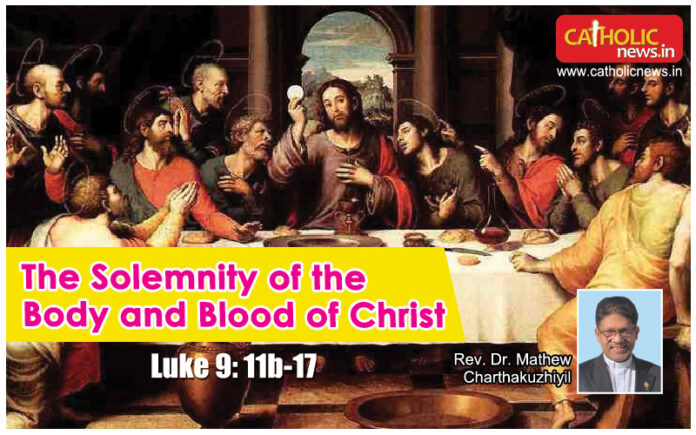
Today we celebrate Corpus Christi, the Solemnity of the Most Holy Body and Blood of Christ — a feast that stands at the very heart of our Catholic faith. It is a day set aside to reflect on the incredible gift of the Eucharist, to honor the Real Presence of Jesus Christ among us, and to deepen our love for this Sacrament that nourishes our souls.
Although the Eucharist has been celebrated since the time of the apostles, the Feast of Corpus Christi was established later in the Church’s history. In the 13th century, a Belgian nun named St. Juliana of Liège received a series of visions from Christ. In them, Jesus expressed his desire for a special feast dedicated solely to the Blessed Sacrament — a day for the faithful to adore and honor the mystery of His Body and Blood, outside of the context of Holy Thursday and the shadow of the Passion. With the support of theologians and bishops — including the future Pope Urban IV — the feast was first introduced in Belgium and later extended to the entire Church in 1264. The same pope commissioned the great theologian St. Thomas Aquinas to compose the prayers and hymns for the liturgy. Many of those hymns — like Pange Lingua and Tantum Ergo — are still sung today in Eucharistic processions and adoration.
The name Corpus Christi simply means “Body of Christ” in Latin. But behind those words lies a profound truth: Jesus is truly present in the Eucharist — not symbolically, not metaphorically, but really and substantially. Under the appearance of bread and wine, we receive the Body, Blood, Soul, and Divinity of Jesus Christ.
We live in a world that often praises independence, individualism, and self-sufficiency. But the Eucharist reminds us that we are not self-sufficient — we are made for communion: with God and with one another. In the Eucharist, Christ gives himself completely to us, and he invites us to give ourselves to him in return. It is a relationship, not a ritual. It is personal, not abstract. Receiving the Eucharist is not just about a moment on Sunday — it’s about what we carry into the week. What we receive on the altar, we are called to live on the street. The Body of Christ that we receive in Holy Communion must shape how we treat the Body of Christ in our neighbor — especially the poor, the lonely, the forgotten.
The Eucharist strengthens us in our weaknesses, comforts us in sorrow, and empowers us to live with love and purpose. When we feel lost, the Eucharist centers us. When we feel unworthy, it assures us of God’s mercy. When we are joyful, it becomes our thanksgiving. On this feast, many parishes hold Eucharistic processions — taking Christ in the monstrance into the streets. Why do we do this? Because the Eucharist is not meant to be hidden in our churches. Christ wants to walk with us — through our cities, our villages, our daily lives. The procession is a sign that we are a pilgrim people, walking with the Lord, bringing his presence into the world. And it reminds us that we ourselves are meant to become living tabernacles — carriers of Christ wherever we go.
Dear friends, the Feast of Corpus Christi is much more than a tradition. It is a celebration of love — the love of a God who did not stay distant but became food for our journey. Let us not take this gift for granted. Let us receive the Eucharist with reverence, gratitude, and joy. And let us allow it to transform us — so that we may become what we receive: the Body of Christ for the world.
Fr. Mathew Charthakuzhiyil



